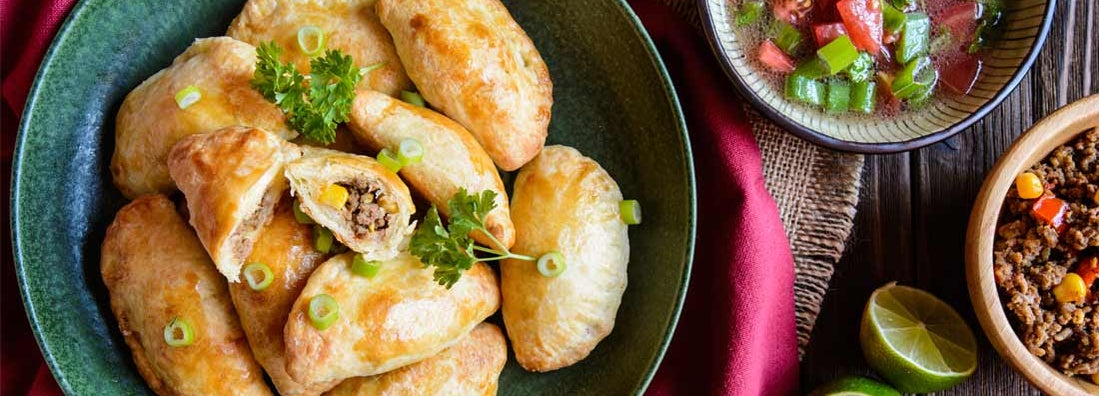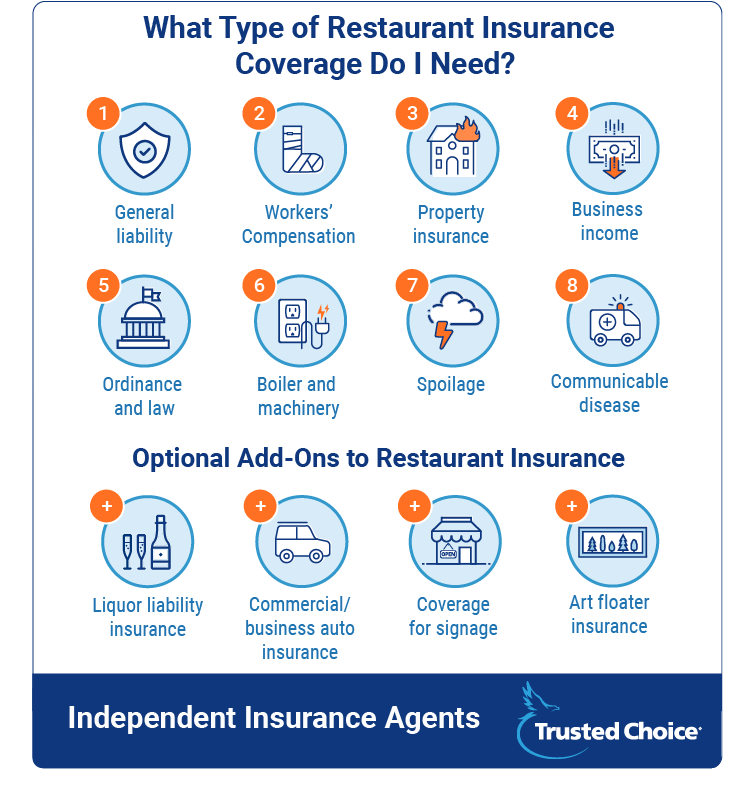Florida Restaurant Insurance
(Here's what you need to know)

Paul Martin is the Director of Education and Development for Myron Steves, one of the largest, most respected insurance wholesalers in the southern U.S.

You've already dreamed up your perfect menu for the restaurant you're opening in Florida. But whether you plan on running a fried 'gator tail stand or a super-classy five-star steakhouse, you'll need to get the right coverage for your business, first. While no one likes to think about the less-fun aspects of restaurant ownership, like potential lawsuits, the sad truth is that these things can (and do) happen.
So that's why we went ahead and broke down all the aspects of restaurant insurance in Florida for you here. We'll go over the basics of a typical restaurant insurance package, and then narrow the scope down to Florida's specific state requirements. Then, when you're ready, our independent insurance agents can help deliver the coverage and the price you need. So grab yourself a side of cocktail sauce and let's dive right in.
What Is Restaurant Insurance?
In short, restaurant insurance is a policy designed to cover all the components involved in your restaurant, from your property and supplies to your employees and customers. Obviously, serving food to the public ties directly into concerns about protecting their health, but restaurant operation comes with many different risks that are important to consider before setting up shop.
What Type of Restaurant Insurance Do I Need in Florida?
Before we get into specific requirements for The Sunshine State, let's take a look at the coverage that restaurant owners anywhere on the map need. Typical restaurant insurance coverage looks like this:
- General liability: This coverage protects against lawsuits related to injury or property damage done by the business, and it's mandatory. Food poisoning claims would fall under this category.
- Workers' compensation: If your employees become ill, get injured, or die from a work-related incident, this aspect of the insurance will cover the financial ramifications. Coverage is mandatory in Florida, as well as most other states.
- Property insurance: This covers any damage to the physical building that houses your restaurant, in case of fire, etc. The type of cooking equipment your establishment uses will contribute to the risk of fire damage, and may influence the cost of your policy. Businesses with deep fryers that use grease, for example, are considered a higher risk.
Note: Restaurants with a drive-thru will have extra property that needs coverage, and paved surfaces (like driveways) are not typically covered by general property insurance. - Business income: A part of property insurance, this aspect covers the financial loss suffered while a business is closed due to fire damage or other disasters.
- Ordinance and law: Another part of property insurance, it covers the financial ramifications if your building is found to not be up to current state code. This coverage also applies in the event that you need to rebuild your restaurant, or if you're building one from the ground up, yourself. Handicap compliant features, fire safety equipment, and emergency exits are all factors, here.
- Boiler & machinery: Also known as "equipment insurance," it covers electric equipment in the building (e.g., AC units and boilers) that breaks down due to power surges, etc. Property insurance may cover this stuff, but not always.
- Spoilage: This coverage takes care of the replacement costs of food that spoils due to power outages caused by storms, surges, etc.
- Communicable disease: Covers any illnesses transmitted to customers due to improper hygiene of your employees.
Optional Add-Ons to Restaurant Insurance in Florida
It's good to have an understanding of the basics included in a standard restaurant insurance policy, but when it comes down to it, that package may not be everything you need. Talk with your agent about optional coverage add-ons, and find out if any apply to you. Until then, here's a brief look at a few of the most common:
- Commercial/business auto insurance: If you run a carry-out restaurant that makes deliveries, you'll want to look into getting coverage for your company vehicles from things like theft and vandalism. Your restaurant will also be held responsible for damage done by your driver while in a company vehicle. Food trucks will also need this coverage.
- Coverage for signage: This coverage protects your signage from things like weather and vandalism since it's not typically covered under regular property insurance. It's especially important for restaurants with a drive-thru, with all the extra signage that could be damaged due to distracted or impaired drivers, or vandalism.
- Art floater insurance: This option exists mainly for the bigger/fancier restaurants with artwork on display. Scheduling an appraisal for the specific pieces you want to cover is the first required step. In case of fire or even theft, this coverage can help prevent having to pay for the replacements out of pocket.
- Liquor liability insurance: While not mandatory, this coverage can fill in some important gaps. General liability will NOT protect you if your employees overserve a customer who ends up with a DUI or other alcohol-related charge. Coverage is more necessary for smaller restaurants, as chains tend to have stricter serving rules and training policies in place to prevent mishaps.

How Do Florida's Dram Shop Laws Influence My Coverage Needs?
Dram shop laws hold a business liable for serving alcohol to minors, as well as for harm caused by an individual who has been overserved by that business — even after they leave your establishment. A state's specific laws and set of associated penalties/fines for violating them can influence your liquor liability coverage needs and the cost of your coverage.
In Florida, as well as most other states, a guest who sustains injuries to themselves due to over-intoxication may not sue the establishment, since it's considered the guest's personal responsibility to monitor how much they consume. So, liability coverage for first-party cases is mainly only required in the case that a minor is served since minors are not legally allowed to drink in any state.
However, third-party liability coverage is crucial. In the case that another individual is harmed by an intoxicated guest, such as in a bar fight or auto accident, they may sue your establishment. For these cases, the third party will need proof that the intoxicated guest continued to be intentionally served past the point of visible intoxication by your restaurant.
Lawsuits can seriously cost you or your business, in the form of significant financial penalties, loss of employment or liquor license, or even jail sentences. Your agent will set you up with the proper liquor liability coverage based on the Sunshine State's unique laws. They'll also explain the costs associated with each level of coverage.
Hurricane Coverage in Florida
Though it's known for the sunshine, Florida actually has a pretty intense storm season . . . that lasts all year. As far as natural disasters go, Florida sees plenty of hurricanes annually.
In fact, Florida is one of the 19 lucky states that require a hurricane deductible with its homeowners insurance policies. So naturally, this requirement may apply to your restaurant, too. You'll need to check with your agent to be sure you're covered, to spare yourself from having to clean up Mother Nature's mess . . . while paying out of pocket for it.
Flood Coverage in Florida
As for all of that beautiful water surrounding Florida? It can lead to floods. The continual rise in sea levels, mixed with Florida's frequent hurricane visitors, makes the perfect recipe for flooding. While we're sure that no restaurant owner in the state is a stranger to Florida's intense storms and tendency towards wetness in general, none of them should be strangers to flood insurance coverage, either.
A standard restaurant insurance policy most likely will not cover flood damage. If your restaurant is in an area deemed to be high-risk, you may be required to purchase extra coverage — though other areas may not escape this need, either. Flood insurance will cover your property (structure of your restaurant's building and what's inside it) if natural water (i.e., rain, waves, etc.) plays rough.
That being said, it's possible that external property, such as your business vehicles, won't be covered under this insurance. Be sure to call your agent and have a lengthy discussion about your coverage status. It's better to just be prepared ahead of time, because cleaning up the mess afterwards is no walk on the beach.
How Much Does Restaurant Insurance Cost in Florida?
It depends on what kind of restaurant you run and a few other factors, such as if you've got employees, offer a delivery service, operate a drive-thru or serve liquor. However, a typical range for coverage starts on the low end of about $10,000/year for a smaller establishment with fewer employees, and hits the high end of more than $100,000/year for a much larger restaurant, like a chain.
A restaurant insurance policy is typically the cheapest and easiest way to go. This package offers most of the liability and property coverage you'll need, and you can always add on specifics as necessary. Your independent insurance agent will know exactly what to hook you up with.
What's the Safest & Cheapest Kind of Restaurant I Can Start?
Obviously, smaller is going to be cheaper. A food truck or corner stand downtown will be by far the cheapest option since there won't be as many sales as in a larger chain, there aren't any other employees (that would require workers' comp), and you won't be serving alcohol. Coverage costs would most likely be in the low thousands each year.
What's the Riskiest Kind of Restaurant I Can Start?
On the other end of the spectrum, a large dine-in chain restaurant with tons of employees, features like a salad bar and buffet, and a liquor bar is by far the priciest/riskiest venture. All the required workers' comp, property, and liability insurance drive up costs exponentially.
It ultimately depends on lots of specifics like the number of employees and the value of the property, of course, but we're talking big numbers, like more than $100,000 per year.
How an Independent Insurance Agent Can Help
Insurance policies are often filled with lots of technical jargon. Additionally, it's a real process to hunt for the RIGHT policy. Fortunately, sifting through the available options and pinpointing the necessary coverage is a task that can easily be handed off to someone else. That's where independent insurance agents come in to save the day.
Independent insurance agents will not only help you get the best possible deal, but also the type of coverage that's right for you. They shop and compare insurance quotes for you, and even break down all that complex jargon into plain old English, so you understand exactly what you're getting.
Finding/Comparing Florida Restaurant Insurance Quotes
Our wise and helpful independent insurance agents will help you determine which types of coverage make the most sense for YOU. They'll also compare policies and quotes from several different insurance companies to make sure they're setting you up with protection that's among the best around. In a nutshell, they'll get the job done — and done well.
ncsl.org
alcohol.org
dui.findlaw.com
servsafe.com
